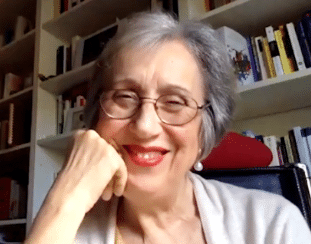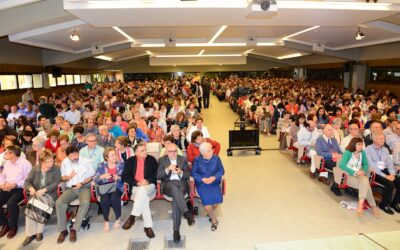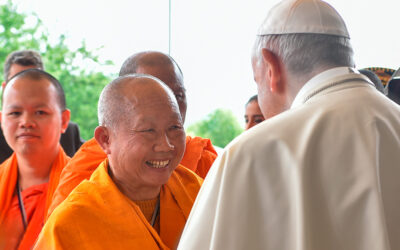The Focolare Youth launched the #daretocare campaign, a new campaign which aims at care of our societies and our planet Earth and at active citizenship that contributes towards building a more united world. Elena Pulcini, professor of social philosophy at the University of Florence, Italy has been interviewed on this subject.  Elena Pulcini, Professor of Social Philosophy at the University of Florence, who has dedicated many years of research on the subject of care, was one of the speakers during the first livestreaming #daretocare, organized by the Focolare youth on June 20th How has the experience of the pandemic, we are all going through, influence your vision on the subject of care? “To me it seems that care has emerged mainly as an aid”, Pulcini explained. “Think of all those involved in the medical and health services. This has given rise to positive elements; it has stimulated feelings such as gratitude, compassion, the feeling of our vulnerability, feelings that somehow we have neglected. All this is very positive because we really need it, and it is essential to arouse those which I call empathic emotions. At the same time, however, care has been restricted to its meaning of assistance, to what the English call “cure” and not “care”. Care must become a way of life”. We dream of a society where care is the backbone of local and global political systems. Is this utopia or is it feasible? “Care means responding to something. In this case it means responding to the awareness that others exist. The moment we realize that others exist and we are not closed in the shell of our individualism, the empathic abilities in us function; this means that we are able to identify and understand the emotions of others. But, today, who is the other? New forms are emerging about those we consider as others. Today, the one that is different is considered as the other, and so are future generations, nature, environment and the Earth we inhabit. If in our relationships we manage to care through our empathic abilities, then care can really become the complete answer to the great challenges of our time. I cannot say whether this is really feasible or not, but I think we can’t lose the utopian perspective. Responsibility is not enough, we need to cultivate hope as well”. What do you suggest that we do to behave in this manner and to lead our societies, starting from our institutions, to move towards care? “I believe that wherever we are we have to behave in a way that care does not remain confined to the private sphere (…). I have to live care in my family, in my teaching profession, when I meet a poor outcast in the street, when I go to the beach; I have to take care of everyone and everything. Care must become a way of life, that crushes our unlimited individualism which leads not only to the self-destruction of humanity, but also to the destruction of world life. Therefore, we must try to respond with care to the pathologies of our society, and this means that we have to educate for democracy. Alexis de Tocqueville, a 19th century philosopher I like, used to say: “we must educate for democracy”. This is a lesson we still need to learn, and I think it means that we have to cultivate our own empathic emotions so that we are stimulated to care with pleasure and gratification, and not with compulsion”.
Elena Pulcini, Professor of Social Philosophy at the University of Florence, who has dedicated many years of research on the subject of care, was one of the speakers during the first livestreaming #daretocare, organized by the Focolare youth on June 20th How has the experience of the pandemic, we are all going through, influence your vision on the subject of care? “To me it seems that care has emerged mainly as an aid”, Pulcini explained. “Think of all those involved in the medical and health services. This has given rise to positive elements; it has stimulated feelings such as gratitude, compassion, the feeling of our vulnerability, feelings that somehow we have neglected. All this is very positive because we really need it, and it is essential to arouse those which I call empathic emotions. At the same time, however, care has been restricted to its meaning of assistance, to what the English call “cure” and not “care”. Care must become a way of life”. We dream of a society where care is the backbone of local and global political systems. Is this utopia or is it feasible? “Care means responding to something. In this case it means responding to the awareness that others exist. The moment we realize that others exist and we are not closed in the shell of our individualism, the empathic abilities in us function; this means that we are able to identify and understand the emotions of others. But, today, who is the other? New forms are emerging about those we consider as others. Today, the one that is different is considered as the other, and so are future generations, nature, environment and the Earth we inhabit. If in our relationships we manage to care through our empathic abilities, then care can really become the complete answer to the great challenges of our time. I cannot say whether this is really feasible or not, but I think we can’t lose the utopian perspective. Responsibility is not enough, we need to cultivate hope as well”. What do you suggest that we do to behave in this manner and to lead our societies, starting from our institutions, to move towards care? “I believe that wherever we are we have to behave in a way that care does not remain confined to the private sphere (…). I have to live care in my family, in my teaching profession, when I meet a poor outcast in the street, when I go to the beach; I have to take care of everyone and everything. Care must become a way of life, that crushes our unlimited individualism which leads not only to the self-destruction of humanity, but also to the destruction of world life. Therefore, we must try to respond with care to the pathologies of our society, and this means that we have to educate for democracy. Alexis de Tocqueville, a 19th century philosopher I like, used to say: “we must educate for democracy”. This is a lesson we still need to learn, and I think it means that we have to cultivate our own empathic emotions so that we are stimulated to care with pleasure and gratification, and not with compulsion”.
The Focolare Youth




0 Comments